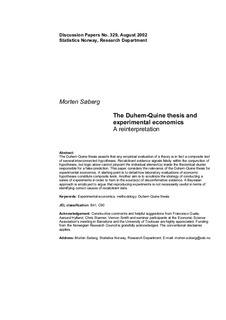| dc.contributor.author | Søberg, Morten | |
| dc.date.accessioned | 2011-11-26T16:04:26Z | |
| dc.date.available | 2011-11-26T16:04:26Z | |
| dc.date.issued | 2002 | |
| dc.identifier.issn | 1892-753x | |
| dc.identifier.uri | http://hdl.handle.net/11250/180409 | |
| dc.description.abstract | Abstract:
The Duhem-Quine thesis asserts that any empirical evaluation of a theory is in fact a composite test of several interconnected hypotheses. Recalcitrant evidence signals falsity within the conjunction of hypotheses, but logic alone cannot pinpoint the individual element(s) inside the theoretical cluster responsible for a false prediction. This paper considers the relevance of the Duhem-Quine thesis for experimental economics. A starting point is to detail how laboratory evaluations of economic hypotheses constitute composite tests. Another aim is to scrutinize the strategy of conducting a series of experiments in order to hem in the source(s) of disconfirmative evidence. A Bayesian approach is employed to argue that reproducing experiments is not necessarily useful in terms of identifying correct causes of recalcitrant data.
Keywords: Experimental economics, methodology, Duhem-Quine thesis. | no_NO |
| dc.language.iso | eng | no_NO |
| dc.publisher | Statistics Norway, Research Department | no_NO |
| dc.relation.ispartofseries | Discussion Papers;No. 329 | |
| dc.subject | Experimental economics | no_NO |
| dc.subject | Duhem-Quine thesis | no_NO |
| dc.subject | JEL classification: B41 | no_NO |
| dc.subject | JEL classification: C90 | no_NO |
| dc.title | The Duhem-Quine thesis and experimental economics. A reinterpretation | no_NO |
| dc.type | Working paper | no_NO |
| dc.subject.nsi | VDP::Social science: 200::Economics: 210::Economics: 212 | no_NO |
| dc.source.pagenumber | 22 s. | no_NO |
